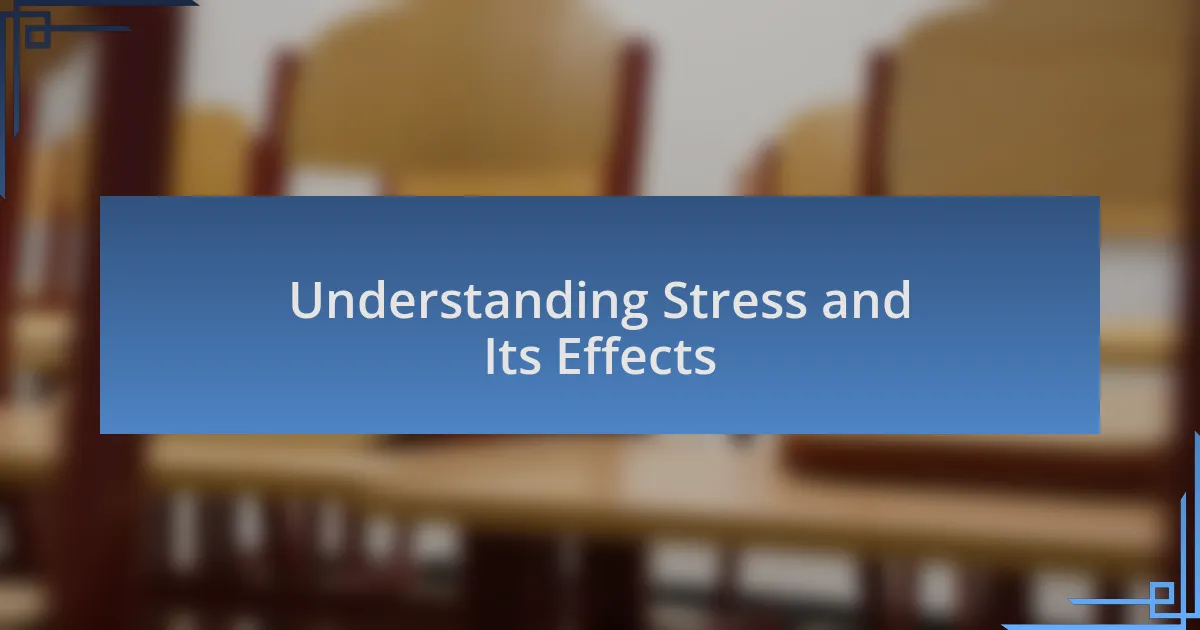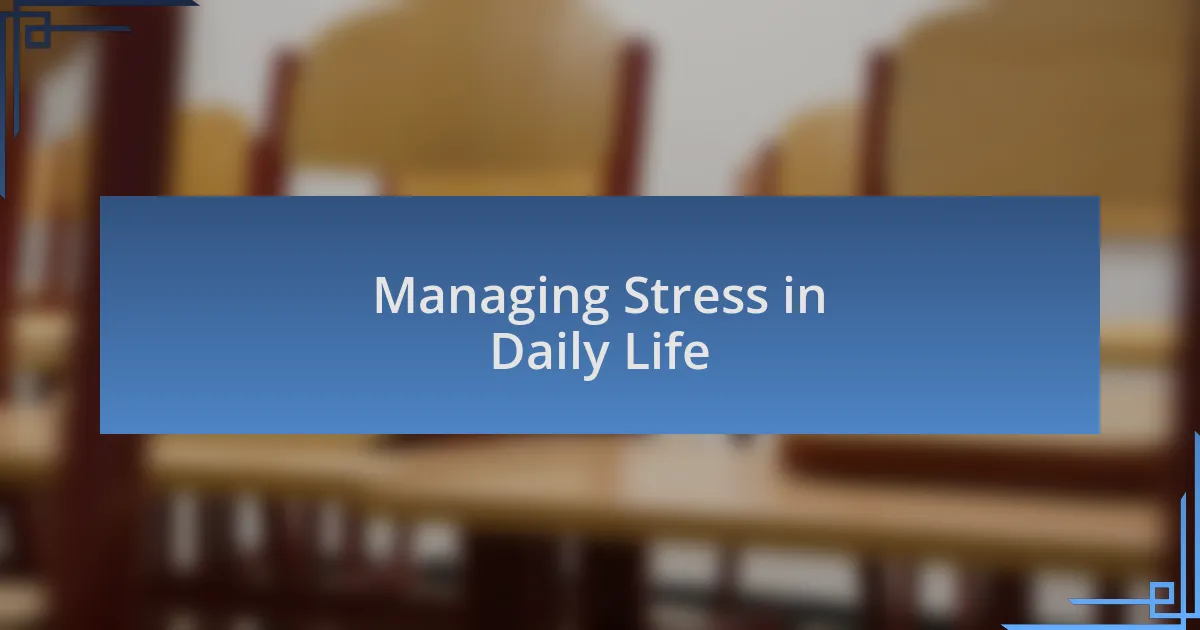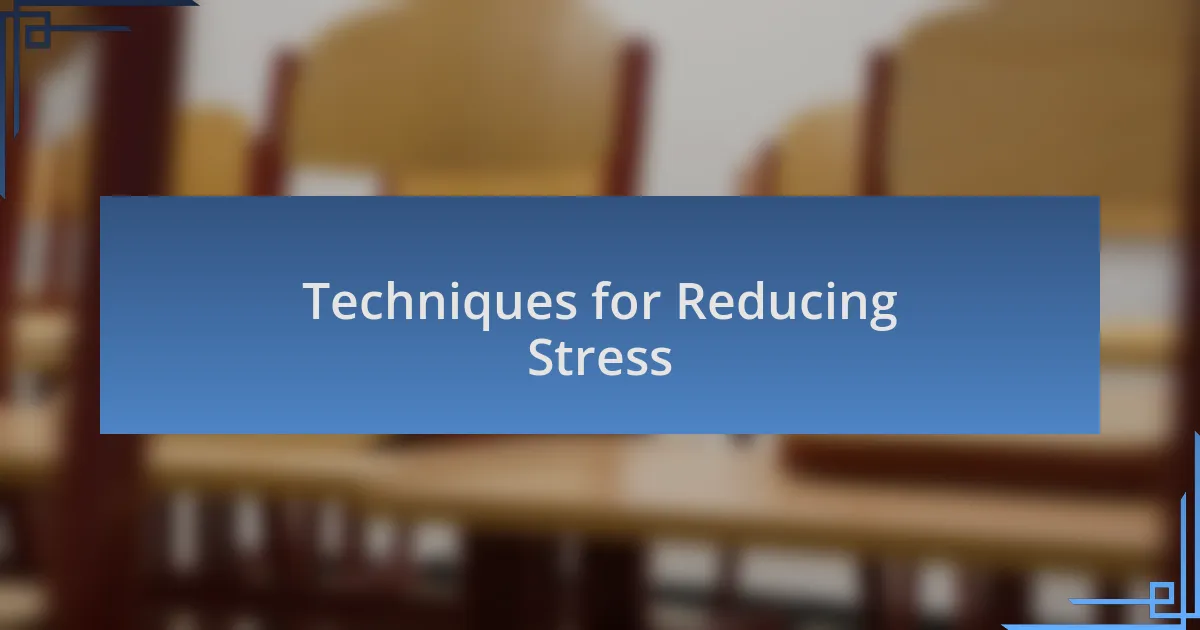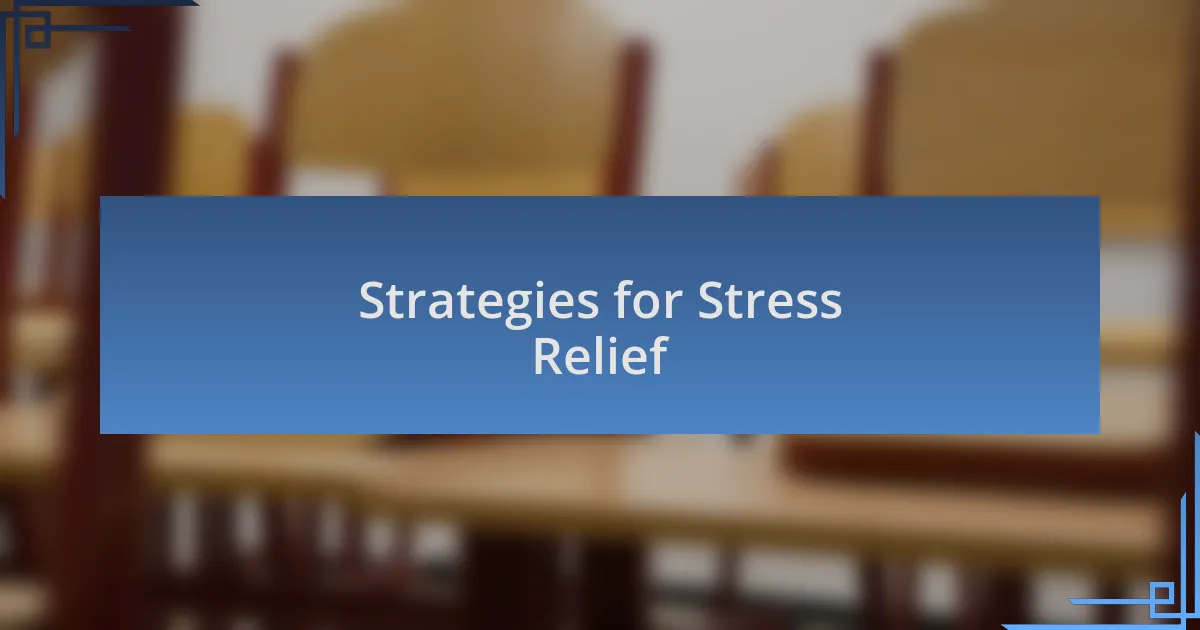Key takeaways:
- Stress affects individuals differently and can impact cognitive functions, relationships, and daily interactions.
- Effective stress management techniques include mindfulness meditation, physical activity, journaling, and creating a supportive environment.
- Seeking professional help can provide tailored coping strategies and validation of feelings, enhancing mental health management.
- Engaging in creative hobbies and connecting with supportive communities can foster relaxation and a sense of accomplishment during stressful periods.

Understanding Stress and Its Effects
Stress is a natural response that affects everyone, yet its impacts can vary significantly from person to person. I remember a particularly overwhelming week when my to-do list felt never-ending; I noticed how my mind raced while trying to focus on a single task. Have you ever felt your heart race during a simple conversation? That’s the body reacting to stress, signaling that something is off balance.
The symptoms of stress can manifest physically, mentally, and emotionally. For me, it often shows up as tension headaches and a racing mind, which can be exhausting. It’s interesting to consider how stress can affect our cognitive functions—like concentrating or recalling information—especially for those of us managing dyslexia. Have you ever found it hard to articulate your thoughts under pressure? It’s not just you; stress can fog our thinking and hinder our ability to communicate effectively.
Understanding the effects of stress is crucial not just for our general well-being but also for our daily interactions and relationships. I once observed how stress transformed a simple family dinner into a source of anxiety when tensions ran high and conversations became stilted. Isn’t it fascinating how stress can permeate our environments, influencing not just our responses, but also those around us? By recognizing these effects, we can begin to develop strategies to manage stress, ensuring it doesn’t dominate our lives.

Managing Stress in Daily Life
Finding effective ways to manage stress in daily life is essential for maintaining well-being. I recall a period when I started my mornings with a short meditation session. It was fascinating how just a few minutes of focusing on my breath helped center my thoughts and eased my anxiety. Have you ever tried taking a moment for yourself amidst the chaos? It can really reshape your day.
Incorporating small, manageable breaks throughout the day can offer immediate relief. I often set a timer for every hour to step away from my work, stretch, or grab a glass of water. This simple act of breaking away, even briefly, creates a renewed sense of clarity. Do you sometimes find yourself lost in your tasks? Resisting the urge to push through can be tricky, but I’ve learned that stepping back allows my mind to recharge.
Creating a supportive environment can significantly influence stress levels. I remember intentionally surrounding myself with positive affirmations and reminders of my goals at home. Have you considered how your space impacts your mood? Keeping a calm, organized environment can foster a conducive atmosphere for both productivity and relaxation, making it easier to manage stress effectively.

Techniques for Reducing Stress
One technique I’ve found incredibly helpful is journaling. After a long day, I often sit down with my notebook and write out my thoughts and feelings. It’s as if I’m unloading a heavy backpack. Have you ever noticed how clarifying your feelings can lighten your mental load? It’s truly a cathartic experience.
I also recommend incorporating physical activity into your routine, even if it’s just a brisk walk. I remember a particularly stressful week when I decided to take a short run each evening. The fresh air and movement released endorphins that lifted my spirits almost instantly. Have you felt that sense of freedom and relief after being active? It’s remarkable how something so simple can remarkably alter your state of mind.
Experimenting with deep-breathing exercises can be a game changer too. One evening, while feeling overwhelmed, I spent a few minutes practicing inhaling deeply through my nose and exhaling through my mouth. Surprisingly, it calmed my racing thoughts in no time. Has anyone ever shared this technique with you? This small practice not only lowers immediate anxiety but also equips you with a tool for future stressors.

Strategies for Stress Relief
One approach I’ve found invaluable for stress relief is mindfulness meditation. I remember the first time I tried it; I was skeptical but decided to give it a shot after a particularly hectic day. Sitting quietly, focusing on my breath, and allowing thoughts to come and go helped create a peaceful space within me. Have you ever tried just being present with your thoughts without judgment? It can truly transform your perspective.
Another strategy that has worked wonders for me is engaging in a creative hobby. During stressful periods, I often immerse myself in painting or crafting. This creative outlet not only diverts my mind from stress but also provides a sense of accomplishment and joy. Have you experienced how creating something from scratch can uplift your mood? It’s incredible how tapping into our creative side can foster relaxation.
Lastly, don’t underestimate the power of connecting with others. I once joined a support group where we shared our experiences and coping strategies. The warmth and understanding of those conversations reminded me that I’m not alone in my challenges. Have you sought out a community for support? Finding a group with shared experiences can be a comforting and affirming way to navigate stress.

Seeking Professional Help for Stress
Seeking professional help for stress can often feel daunting. I remember the first time I walked into a therapist’s office, my heart raced with uncertainty. But as I began to share my feelings, it became clear that professional guidance could unravel the multifaceted layers of my stress. Have you ever considered how a professional’s perspective can illuminate paths you might not see on your own?
Talking to a counselor or psychologist can provide tailored coping mechanisms that resonate with what we individually experience. I was surprised to learn new strategies I had never thought of, like cognitive behavioral techniques that helped reframe my anxious thoughts. It made me wonder—how many of us stick to methods that don’t serve us simply because they are familiar?
Additionally, I found that a support system provided by mental health professionals can be transformative. For me, the validation I received when discussing my feelings was incredibly powerful. It’s like having a personal cheerleader who understands the unique struggles of managing stress. Have you experienced that sense of relief when someone truly listens and validates your emotions? Seeking professional help may just be the first step you need to take on your journey to better mental health.